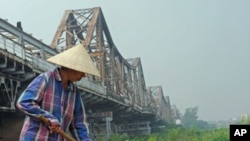About 200 people from across Asia protested Thursday outside a shopping complex in front of the World Bank office in Bangkok.
The demonstrators, primarily land rights activists, say the global lender’s principles of responsible agricultural investment, known as RAI, fail in their stated objective to protect rights of small farmers.
Protest leaders told the Foreign Correspondents Club of Thailand the principles indirectly endorse land grabs by speculators because they are weak and fail to question ownership rights.
Jeff Wong, anti-eviction coordinator for LOCOA, a group of female community leaders supporting slum dwellers in India, Indonesia, and the Philippines, says the principles encourage consolidation and development of rural land.
"In effect, the principles of responsible agricultural investment, as it turns out, end up giving a green light to investors who wish to buy land in rural areas causing great displacement," says Wong, explaining that, subsequently, many small farmers are forced to look for work in cities where too many end up in poverty. "[It] often takes [the] form of land-grabbing involving violence, corruption, collusion with local government, and so on."
The World Bank worked with other United Nations agencies to develop the seven principles of investment, which include respecting land and resource rights.
They also say investments should ensure food security, transparency, good governance, consultation and participation, and sustainability.
However, the principles are voluntarily enforced, and activists say that makes it easy for small farmers to be pushed around.
Rebecca Leonard of the activist group Focus on the Global South says there is not enough support for farmers who want to keep their land.
"It does not consider the interests and the long-term struggles of the peasants and farmers movements around the world for agrarian reform," she says. "It does not consider the need that has been expressed to redistribute land and to reorganize the way that land is managed in the countries."
The protesters presented their petition to World Bank representatives.
Salman Zaheer, the World Bank’s program director for regional integration in South Asia, says the bank’s policy was aimed at protecting small landholders and addressing unequal negotiations between farmers and larger industry.
"So, it’s interesting that they are actually complaining exactly about that," said Zaheer. "So it’s important for us to listen to their concerns, because obviously the intention of the policy was exactly to address their concerns. So, if their concerns still remain, or [are] even aggravated, then we certainly need to hear and understand what their concerns are specifically."
Zaheer said they agreed to hold a formal meeting with activist leaders this month to discuss their complaints and see how they might be addressed or incorporated into the World Bank principles.
Asia Land Rights Activists Protest World Bank




